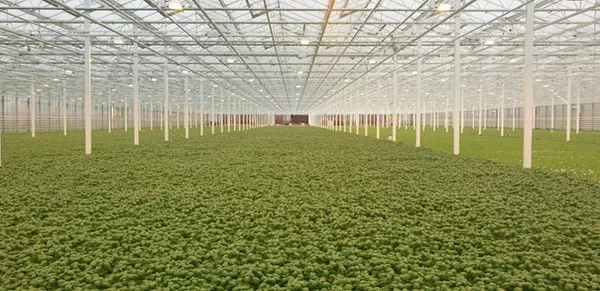In Europe, the closure of the hospitality sector has greatly affected fresh herb sales. This is evident to Jacqueline Monden. She and Christ Monden run De Kruidenaer herb farm in the Netherlands. "Hospitality businesses can't open their doors to the public over Christmas. The only alternatives are takeaways and delivery. So, those sales will be down. But retails sales should increase."
 Basil in the greenhouse, source LinkedIn
Basil in the greenhouse, source LinkedIn
De Kruidenaer specializes in growing and selling basil. "Besides the standard variety, we have several special kinds too. These include red, pesto, and Thai basil. These are more niche products. In that category, Thai basil is particularly popular. There are no real newcomers on the shelf this year." Jacqueline thinks better-known herbs will do well this year.
That's because the restaurants and bars are closed. So, retailers will sell more of these herbs. "Basil, rosemary, dill, thyme, sage, and tarragon always do particularly well. Nevertheless, I still see room for further consumption growth in the Netherlands." The increased attention to health helps herbs' rise in popularity. De Kruidenaer has a range with over 30 different varieties. They're developing several new kinds too.
The Northern European fresh herb season has now come to an end. "We still have basil in our greenhouses," says Jacqueline. "And, here and there, chervil and coriander are available on the market. But most herbs now come from countries like Spain, Morocco, Israel, and Kenya."
The coronavirus pandemic means many overseas growers are being careful with how much they're planting for the upcoming season. "Farmers prefer taking fewer risks. They don't want to have to throw away fresh herbs. That means less availability on the market. All these developments, combined, mean market prices are slightly higher than last year. That, however, varies greatly from herb to herb. I think prices will remain stable. I'm hoping for a few good sales weeks."
Jacqueline hasn't decided on a Christmas meal yet. "We haven't thought about it. Something including our herbs, of course. And the table decorations will include rosemary sprigs. Along with cinnamon sticks, these make for a wonderful fragrance in the air during dinner," she concludes.
Voor meer informatie:
De Kruidenaer
www.kruidenaer.nl
Jacqueline Monden
jacqueline@kruidenaer.nl
